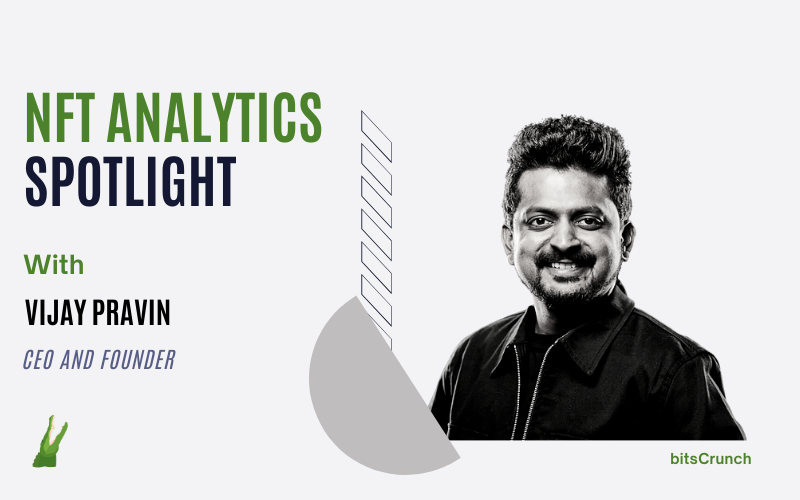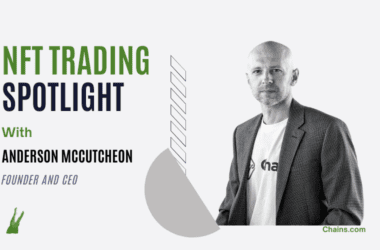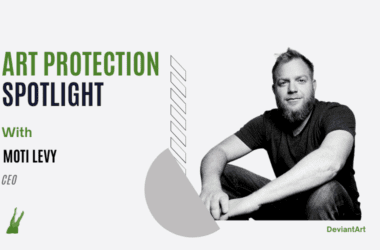The NFT space has opened doors for creators to engage with their fans online, build communities around their art and for some, make a name for themselves and millions of dollars. Without the confinements of traditional art spaces, the NFT market has also given people wider access to art collecting and investing.
However, it’s no secret that there is a dark side to the NFT space as the market is still nascent. Counterfeits, spear-phishing attacks, marketplace exploits, scams, and wash trading are some of the issues currently plaguing the ecosystem.
Not only are NFT newbies more susceptible to falling for scams, but even seasoned industry players and NFT collectors have been victims of NFT theft. Recognising that these issues could deter people from getting into NFTs, Vijay Singh co-founded bitsCrunch, an NFT analytics and security startup. Calling itself a “guardian of the NFTs ecosystem,” the startup aims to eliminate hurdles that may come up along the way for anyone buying, minting or selling NFTs.
Piggybacking on the traction that blockchain and NFTs have gained in recent years, bitsCrunch has recently raised $3.6 in funding in an oversubscribed private round led by Animoca Brands. Off the back of its recently announced partnership with Mastercard, we get Vijay Pravin to share more about how bitsCrunch’s AI security tools work, and his views on the NFT market.
Please tell us about yourself and the story behind bitsCrunch.
It’s great to meet you! I’m Vijay Pravin, the CEO and Founder of bitsCrunch based out of Munich, Germany. I began my journey to where I am, where I graduated with a degree in Instrumentation Engineering from Anna University in Chennai. I hold a Masters in Technical University of Munich in Electronics and Communication Engineering. I now find myself at the helm of my own company and this journey has been absolutely remarkable!
My career in this industry began as a Data Scientist at Telefonica in Germany after which I worked at Volkswagen AG for a few years. That was followed at Siemens where I was an Analytical Solutions Expert. When blockchain and NFTs began to gain traction, I decided to jump in and be a part of this revolutionary new industry.
Along with my CTO and a few other like-minded, tech-savvy individuals, I was fascinated by the way in which blockchain and AI have transformed the field of data analytics. It feels like an entirely new adventure to me because NFTs are like a niche in the vast ocean of data analytics and we have chosen to sail those unknown waters on our own. It is why we started bitsCrunch. We wanted to solve the dark side of NFTs and offer solutions to the community that are effective and also engaging. To put it simply, the work we do and the industry we occupy are both unprecedented.
What piqued your interest in the NFT space and where did you first hear about it?
Having a background in Data Analytics helped me see the value of blockchain technology and NFTs quite early on since their inception. I have always been a fan of innovations in technology and this was revolutionary to me. I strongly believe that NFTs and the many other applications of blockchain we are seeing are here to stay, and that they will continue to add value to our lives in different ways.
Walk us through a typical day in your life.
As a CEO, it keeps changing. I love such dynamic days. There are no so-called ideal ‘typical days’ for me at work. One thing is sure, I am already a beginner at so many things now in this journey. I know a bit of legal, accounting, sales, and marketing on top of tech.
What inspired the idea behind bitsCrunch?
Our entire lives exist in some form digitally today. Even this interview is going to exist on a webpage. Discussions about brands and domains are almost commonplace these days. We buy groceries, gadgets, attire and so many other products online, and pay for them digitally as well.
This has only increased in the wake of the pandemic, leading to system-wide upgrades and a focus on contactless processes. It is only natural to be hesitant towards new forms of technology as a consumer but think about how AI has come to be an integral part of any technological experience today compared to its existence a few years ago.
I think NFTs are geared towards a similar trend. You have heard of digital gold. They are like digital assets whose position in the blockchain marketplace is sure to strengthen over the course of the next few years. Our team remains certain of blockchain’s potential, and the value that it can add to every individual who engages with it. Our vision is to bring trust, integrity and transparency across blockchain and NFT communities.
Please tell us more about the AI models that bitsCrunch uses for the suite of products. How does it work?
Our AI is specially designed with the known issues that NFTs face today in mind. We aim to create solutions that prevent any malicious attempts to manipulate the market values of NFTs or to duplicate them and push counterfeits at the value of the original. We created code that lets our tools automatically aggregate data across blockchain platforms and validate this data. It then presents you with its findings in a way that makes it simple for you to make decisions about buying or selling NFTs, with the safety and security of knowing you can transact in a protected environment.
According to bitsCrunch’s wash trading analysis, 33% of $1.26B of NFT sales was wash traded, how do you see the Scour product as part of the NFT ecosystem?
I see it as a sort of AI watchdog that can sniff out wash trading in an instant and also pinpoint IDs or wallets that have indulged in the practice. In this sense, Scour is like the night watchman of our suite of tools, acting behind the scenes to ensure that instances of wash trading are captured, recorded and presented to end-users with minimal fuss and with all relevant information at their fingertips.
What does the large amount of wash trading say about the NFT market?
It says that there are those who will continue to use the technology in ways that are dishonest and potentially harmful to the community as a whole. I would argue that this is an inevitable part of any technological innovation and must be taken up as a continuous challenge. If you are familiar with the Japanese concept of kaizen, which means continuous improvement, I would argue that the NFT space is pretty new at this point, and it needs a lot of improvement.
What are some of the most important lessons you’ve learnt through your entire career so far?
To be consistent is something that has become a habit for me now. Issues keep coming in every aspect of life, and the art of living is all about having priorities.
Many Web3 entrepreneurs have mentioned that finding the right fit for their team has been difficult. Has that been your experience? What do you look for when hiring employees?
Yes totally. Hiring is the toughest part. There is a lack of clarity and education among the wider audience. We now look at the soft skills, interpersonal skills and attitude. With that, we believe that anyone can be groomed into a role.
Please tell us more about your incubation/partnership with Mastercard. What else will it entail?
Mastercard is looking to penetrate the NFT space. They are planning to integrate their payment gateways into NFT marketplaces. They want to make sure that NFTs are traded fairly and at a fair price, and that is where they need our security services.
What can users look forward to from bitsCrunch this year?
The primary goals this year are to focus on bringing more web 2.0 players into web 3.0, educate people more on NFTs, provide more job opportunities, hold a Token Generation Event, encourage more women into workplaces and ultimately, make a positive difference in the lives of many people.
Where do you think we could see NFTs in the near future?
NFTs have almost a limitless number of use cases. Some predict that in ten years, all purchases will include NFTs. Others believe that smart contracts will eventually supplant legal paperwork. Many people believe that NFTs are a gimmick or that they are too esoteric to be broadly adopted.
Major companies like Meta, Twitter, Reddit, and Visa are paying attention to the trends of the industry keenly and are working to ensure that they don’t miss out on the NFT craze. The latest and upcoming trends in the world of NFTs are NFT ticketing, financial NFTs, ccaling blockchain and websites, NFT streaming, NFT Gaming, and NFT Art.
Stay up to date:





